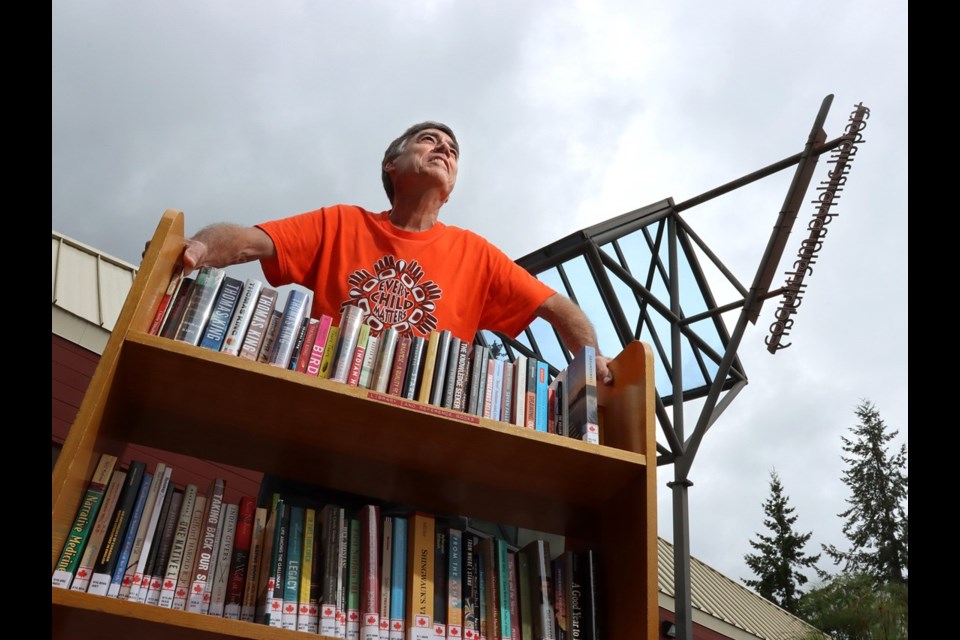For nearly half a century, Alf Dumont has tried to come to terms with his identity.
A person of Ojibwa or Anishinaabe descent, the Coquitlam resident also claims French, Irish and English heritage.
To help him better understand his lineage as both a First Nation and a European settler, Dumont picked up books and read.
And read.
And read.
In fact, he gathered so many publications over the years (sometimes multiple copies of the same work) that his private library overflowed.
Last month, just week after the federal government declared Sept. 30 as National Indigenous Peoples Day to commemorate the legacy of residential schools in Canada, Dumont walked into the Coquitlam Public Library unannounced to ask if he could add to its materials.
Library officials couldn’t believe his request.
“We are absolutely over the moon that he reached out with this offer,” Rachel Burke, the library’s e-branch and collections manager, told the Tri-City News.
Dumont’s donation of 215 books — the same number as the bodies found this year near a Kamloops residential school — has officially launched the library’s Indigenous book collection, which will be split between the City Centre and Poirier branches.
Penned by Canadian and international authors, the fictional and non-fictional publications are told through an Indigenous lens. They include Eddie Benton-Benai’s The Mishomis Book: The Voice of the Ojibwe; Coyote Medicine by Lewis Mehl-Madronna; and Kim Anderson’s Life Stages and Native Women: Memory, Teachings and Story Medicine.
With his donation, Dumont hopes that Coquitlam residents and other library users will check them out to be “re-educated” about the impacts of residential schools and the 60’s Scoop, as well as “the intentional breakdown of Indigenous cultural and spiritual ways of governing and leading in their communities.”
HOW HE BEGAN
For Dumont, he was in university when he started his journey of self-discovery.
Later, as his quest deepened, he sat in on circles and listened to the stories told by Indigenous participants, many of whom were also on the same path of reckoning with their dual heritage.
In the 1980s, as a United Church of Canada minister and leader, the Rev. Dumont was tapped by the church to organize Indigenous ministry training. His work was conducted through two organizations that he helped to set up: the Dr. Jessie Saulteaux Resource Centre and the All Native Circle Conference.
The books that Dumont donated to the Coquitlam Public Library are largely a result of that work and study, he said.
Still, after he and his wife, Barb, moved to Coquitlam from Ontario a decade ago to be closer to their two sons, and after he retired, Dumont continued to seek answers about his identity and Canada’s stained history.
Last June, Dumont published a memoir titled The Other Side of the River: From Church Pew to Sweat Lodge.
And, earlier this year, he and his sons received their Anishnaabe status from the federal government (both his mother and grandmother married off the reserve, thereby revoking their status as Indigenous people).
An Elder at the Indigenous Services Centre at BCIT, Dumont said the books that he donated to the Coquitlam Public Library will help non-Indigenous people have a better appreciation of Canada’s colonial past, and help Indigenous people “tell their stories more honestly.”
“So many things were taken away from Indigenous people,” he told the Tri-City News on Monday, adding, “I wanted these books to be available to other people, in our community, who choose to walk in a new way with our Indigenous people.”
“Change comes when we re-educate ourselves and are open to new ways of walking with others,” he said. “I hope these books open doors for all people.”





